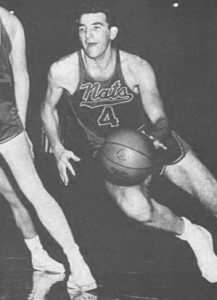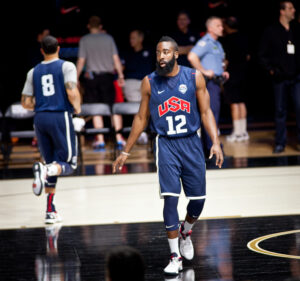In 2023, the sports betting industry in the United States surpassed $10.9 billion dollars in revenue, representing a smashing 44.5% increase from the previous year. As such, Voice Sports has decided to recap the good, the bad, and the ugly of the industry.
Sportsbooks’ Journalism Takeover
I get most of my sports recaps from podcasts like the Dan Le Batard Show and, over the past few years, I’ve noticed a marked shift in their advertisers. What was once O’Reilly Auto Parts has now become DraftKings. What’s more, go into any bar playing ESPN and see that what used to be a ticker with score updates now shows betting odds and an over/under line.
Gambling ads are helpful for supporting independent podcasts; however, for ESPN—the self-proclaimed “worldwide leader in sports”—this coupling of betting lines and news updates, which can directly change those lines, seems ripe for exploitation.
For this reason, I was horrified when I opened my ESPN app and saw “ESPN Bet” all over my screen. In November 2023, ESPN partnered with PENN Entertainment to create an online sportsbook with the global brand’s name. Not only did the largest sports media conglomerate launch a sportsbook, they did so by subtly rebranding their SportsNation social media accounts, which already amassed over 10 million followers, forcing users to engage with ESPN BET.
One example of the ethical dangers of this deal occurs when journalists release gambling content. For the 2024 NBA Playoffs, ESPN News released an article analyzing the bets to make during the NBA playoffs. While the writer has clearly put expert thought into his picks, his advice is cheapened when coupled with a large ESPN BET button in the website’s navigation bar. To be clear, the journalist did nothing wrong by releasing this article, but the potential for this advice to sway the betting lines on ESPN’s own sportsbooks raises significant ethical questions. An ESPN analyst has already had to issue an apology for claiming live on-air that a colleague’s March Madness over/under picks through ESPN BET were “a risk-free investment.”
ESPN BET has also created an even worse scenario for exploitation. Under ESPN’s own guidelines, employees are not allowed to place bets on any sportsbook after obtaining confidential information. However, what if the reporter informs a friend and no one catches them? What if that journalist is not caught betting? What if a reporter accidentally misled the public when releasing news, causing betting lines to change—something that many accused The Athletic’s Shams Charania of doing during the last NBA Draft? The number of what-ifs this move has created should be enough to shut down the sportsbook. Yet, the money is lucrative, and after years of ESPN laying off top talent like Dan Le Batard, Jeff Van Gundy, and Jalen Rose, the sportsbook is quite clearly an important asset in ensuring the future success of the company. But for the sake of sports journalism writ large, maybe it shouldn’t be.
– Bradshaw Cate
Lessons from across the pond: Betting and soccer in England
Over in the United Kingdom, a long-standing system of sports betting provides a model for a (somewhat) healthy, lasting relationship between betting and sports. Betting shops became legal in the 1960s, and since then, betting has become a huge part of the British sports economy. In particular, the Internet Age has made it easier to bet through gambling websites, with the most popular garnering tens of millions of monthly users. The total market size for sports betting in the UK was estimated at $5.4 billion in 2021.
Out of the millions of users, many have a healthy relationship with betting. However, there may be millions of adults across the UK who are struggling with a gambling problem, according to the Gambling Commission, with some estimates reporting that over 60% of gamblers have issues with debt.
Currently, eight of the 20 teams in the Premier League have a betting company as their primary shirt sponsor. That means that for fans of 40% of England’s elite clubs, every time they watch a game, buy a jersey, or see photos of their favorite players, they’re looking at a gambling ad. Although the league is getting rid of gambling sponsorships on the front of teams’ kits by the start of the 2026-27 season, ads will still be allowed on the sleeves and throughout teams’ stadiums.
The Premier League’s close relationship with the betting industry is not something that just impacts fans. Similar to U.S. pro leagues, players in all of England’s professional soccer leagues are not allowed to bet on soccer, although they may bet on other sports. However, many players have run afoul of this rule in recent years.
Ivan Toney, a striker for Brentford F.C., received an eight-month ban for betting on his own club, including bets on his own team to lose some games he did not play in. Newcastle United F.C. midfielder Sandro Tonali, who joined the Premier League club for a huge $70 million fee, received a 10-month suspension for betting on matches in Italy.
The frequency of these suspensions might be a sign of a new normal for professional sports. The lifetime ban of Jontay Porter from the NBA sent shockwaves through American sports, but players in England who committed similar offenses received much more lenient punishments. American sports leagues must respond to the rise in sports betting, and the example of European soccer shows that when gambling and sports have a close relationship, players can and will run afoul of gambling rules.
When players struggle with gambling, leagues should offer support and resources. In an interview after the conclusion of his suspension, Toney described his relationship with gambling as “unhealthy” and said he was “naive” when he was betting. Athletes like Toney who show self-awareness and growth don’t deserve lifetime bans. Creating established but lenient guidelines for players who break gambling rules is crucial for American sports to build a strong relationship with the betting industry.
– Andrew Swank
Betting on the growth of women’s sports
On the surface, sports gambling seems like a male-coded hobby. Most of the big bets are men’s sports, and almost 70% of all sports bettors are male. One of the less examined benefits of sports betting, though, is how it can be utilized as a tool for growing women’s sports.
Take women’s basketball, for example. Sportsbooks reported a significant increase in betting interest on this year’s women’s March Madness. With games being played on more accessible TV networks, and with superstars like Caitlin Clark and Angel Reese becoming household names, the market has exploded—and thus betting has too.
This, in turn, gives people who might not otherwise watch women’s basketball consistently a reason to tune in more often. And once they’re there, well, some of them will genuinely enjoy watching the games, building up a larger fanbase who will support the teams they once watched only for betting purposes.
This mentality doesn’t stop at the collegiate level, either. With the aforementioned Clark’s recent entry into the WNBA, sportsbooks have exploded with related bets. Per FanDuel Sportsbook’s social media, the Indiana Fever (Clark’s new team) have received the most bets to win the WNBA championship this season, and Clark herself has received 10 times more MVP bets than any other player in the league.
Now, whether these bets are intelligent ones or not is a different conversation. The fact remains, though, that women’s sports are on the come-up, and sports betting can aid them in that climb.
There are, of course, pitfalls to this line of thinking. For starters, there’s no guarantee that people who bet on these games will stick around—though statistically speaking, some of them likely will. Additionally, some of the ideas that sportsbooks promote about the women’s game are simplified to the point of being disingenuous.
They focus on the stars, the media darlings. Those looking at sportsbooks for the WNBA will see a lot of things about Caitlin Clark and not a ton else, at least right now. This hyperfocus on certain individuals might help create interest and grow the game’s watchers, but it isn’t sustainable long-term.
But those problems don’t outweigh the benefits—because women’s hoops are on the rise. For the first time ever, women’s March Madness final had more viewers than the men’s tournament (18.87 million to 14.82 million). Caitlin Clark just signed an eight-figure deal with Nike that’ll come with a line of signature shoes. Her Fever will have 36 of their 40 games televised nationally (the Las Vegas Aces will have 35 and the New York Liberty will have 31). Women’s basketball is here, and sports betting can help it reach even greater heights.
– Jo Stephens
The NBA’s growing pains in the age of sports betting
Last month, during crunch time of a close game against the Cleveland Cavaliers, Rudy Gobert, the center for the Minnesota Timberwolves and three-time NBA Defensive Player of the Year, found himself in hot water. With 30 seconds left on the clock, Gobert made a “money sign” gesture toward referee Scott Foster, implying that the official’s call was influenced by bets placed on the game. Gobert was then ejected from the game and subsequently fined $100,000, the maximum allowable fine under the NBA’s collective bargaining agreement. After the game, Gobert stood by his response, saying, “I’ll be the bad guy. I’ll take the fine, but I think it’s hurting our game. I know the betting and all that is becoming bigger and bigger, but it shouldn’t feel that way.”
Amid players like Gobert expressing their frustrations about the increasing influence of sports gambling on the NBA, the league appears to be endorsing its expansion.
On March 19, the NBA announced its partnership with Portradar, a global data company, to launch a new function within the NBA League Pass app. This feature updates viewers with betting odds during games and allows viewers to seamlessly bet at either FanDuel or DraftKings, all without leaving the game livestream.
As the NBA’s ties with sports gambling grow stronger, it’s crucial to consider the potential consequences: will it compromise the league’s integrity?
The NBA has faced significant integrity challenges in the past, notably with former referee Tim Donaghy, who admitted to betting on games he officiated during the seasons from 2002-03 to 2006-07. Donaghy was subsequently arrested and sentenced to 15 months in prison following an FBI investigation. Then-NBA commissioner David Stern characterized the episode as a “wake-up call” for the league to address the influence of gambling. However, preserving league integrity has become even more crucial in today’s landscape, with the NBA and most professional sports leagues embracing sports betting.
The recent case of Toronto Raptors’ former power forward Jontay Porter underscores the ethical dilemma for athletes and the league as sports betting gains popularity. While athletes can bet on other leagues, betting on their own league—and especially on their own team—is a line that should not be crossed.
Following an internal investigation—revealing that Porter had leaked confidential information to bettors, intentionally limited his participation in at least one game while with the Raptors, and placed bets on NBA games while in the G League—Porter has been banned from the league.
In announcing the ban—the first gambling-related ban since 1954—NBA commissioner Adam Silver emphasized the league’s vigilance in addressing the matter. He pledged to “work diligently to safeguard our league and game,” hinting at the necessity for regulatory changes. However, with the increasing intertwining of the league and gambling, alongside predictions for substantial growth from a $10 billion to a $45 billion industry in the coming years, the question remains: how will the league move forward, balancing the growing industry while retaining the integrity of the game?
– Anna Cordova






